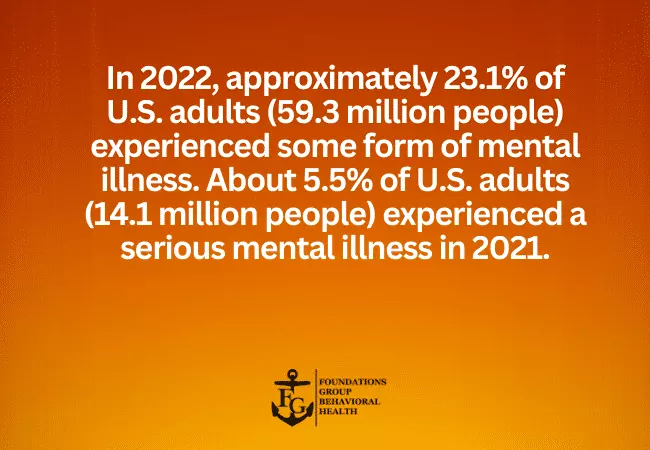Mental health challenges are a reality for millions of people worldwide, yet many individuals hesitate to talk about their struggles. Whether due to stigma, fear of judgment, or uncertainty about how others will react, opening up about mental illness can feel overwhelming. However, talking about your mental health is one of the most powerful steps toward healing and seeking support.
At Foundations Group Behavioral Health, we believe that mental health conversations should be normalized, just like discussions about physical health. Our Psychiatric Day Treatment, Half-Day Treatment Programs, and Outpatient Mental Health Programs provide individuals with the resources and professional care they need to navigate conditions like anxiety, depression, ADHD, PTSD, and co-occurring disorders.
If you’re struggling with your mental health and wondering how to talk about it, this guide will help you understand why it’s important, how to start the conversation, and where to find professional support.
Why Talking About Your Mental Illness is Important
Opening up about mental health struggles can feel vulnerable, but it plays a crucial role in reducing stigma, building a support system, and improving emotional well-being.
1. Reducing Stigma and Encouraging Acceptance
Despite growing awareness, mental health stigma still exists. People may fear being labeled as “weak” or “unstable” for acknowledging their struggles. However:
- 1 in 5 U.S. adults experiences a mental health disorder each year.
- Mental illnesses like anxiety and depression are just as real and treatable as physical conditions like diabetes or high blood pressure.
- Talking about mental health normalizes the conversation, making it easier for others to seek help.
2. Strengthening Personal Support Systems
Isolation can worsen mental health conditions. Sharing your struggles with a trusted friend, family member, or therapist can help you feel:
- Less alone in your experiences.
- More supported when navigating challenges.
- Encouraged to seek professional treatment when needed.
3. Accessing the Right Treatment and Resources
Many individuals struggle in silence because they don’t know where to find help. By talking about your mental health, you open the door to:
- Professional therapy and counseling.
- Mental health treatment programs designed for specific conditions.
- Support groups and community resources for ongoing care.
4. Improving Emotional and Physical Well-Being
Keeping emotions bottled up can lead to:
- Increased stress, anxiety, and depression symptoms.
- Physical symptoms like headaches, fatigue, and muscle tension.
- Unhealthy coping mechanisms like substance use or social withdrawal.
Talking about mental health helps regulate emotions and promotes overall well-being.
How to Talk About Your Mental Illness
Starting a conversation about your mental health can feel overwhelming, but with the right approach, you can communicate your feelings effectively.
1. Choose the Right Person to Talk To
Finding a trustworthy, understanding person can make the conversation easier. Consider talking to:
- A close friend or family member.
- A therapist, counselor, or mental health professional.
- A trusted colleague, mentor, or religious leader.
- A support group where people share similar experiences.
2. Decide How Much You Want to Share
You don’t need to explain everything all at once. Start small by saying something like:
- “I’ve been feeling really overwhelmed lately, and I wanted to talk to someone about it.”
- “I’ve been struggling with anxiety, and I’m trying to figure out how to manage it.”
If you’re comfortable, you can share details about your symptoms or how your condition affects daily life.
3. Be Honest About What You Need
Clarify whether you’re looking for:
- Emotional support (someone to listen).
- Practical help (assistance in finding a therapist or treatment program).
- Advice or coping strategies for managing symptoms.
For example:
- “I don’t need advice, but I just need someone to listen.”
- “Can you help me find a mental health program that offers outpatient support?”
4. Prepare for Different Reactions
Not everyone will react perfectly or understand immediately—and that’s okay.
- Some people may not know how to respond but still care.
- Others may relate and share their own experiences.
- If someone dismisses your struggles, don’t let it discourage you—find a more supportive person to talk to.
5. Consider Professional Mental Health Support
If opening up to loved ones feels difficult, talking to a therapist or mental health professional can be a great first step. Professional treatment programs, such as Psychiatric Day Treatment or Outpatient Mental Health Programs, provide structured support in a safe, judgment-free setting.
Overcoming Common Fears About Talking About Mental Health
1. “What if People Judge Me?”
- Reality: Mental illness is common, and most people are more supportive than you think.
- Solution: Start with someone you trust, such as a friend, family member, or therapist.
2. “I Don’t Want to Burden Others.”
- Reality: People who care about you want to support you.
- Solution: Say, “I just need someone to listen. I don’t expect you to fix everything.”
3. “What If Talking About It Makes Things Worse?”
- Reality: Keeping emotions inside often makes symptoms worse. Talking helps relieve emotional distress.
- Solution: Take it slow and talk about what feels comfortable for you.

How Professional Mental Health Treatment Can Help
If you’re struggling with mental illness, professional treatment can provide the tools and support needed for long-term healing.
1. Psychiatric Day Treatment for Intensive Support
- Full-day structured therapy for severe anxiety, depression, PTSD, and other conditions.
- Includes individual therapy, group therapy, and medication management.
- Ideal for individuals who need daily intensive care.
2. Half-Day Treatment Program for Flexible Support
- A structured program that allows individuals to attend therapy sessions while maintaining work or school schedules.
- Provides coping skills, therapy, and emotional support for individuals managing mental health conditions.
3. Outpatient Mental Health Program for Long-Term Recovery
- Weekly therapy sessions tailored to anxiety, ADHD, depression, and trauma disorders.
- Helps individuals maintain progress while balancing daily life responsibilities.
4. Trauma Disorder Treatment Program for PTSD Recovery
- Specialized care for individuals dealing with past trauma, PTSD, and emotional distress.
- Integrates EMDR, cognitive behavioral therapy (CBT), and mindfulness-based approaches.
If you or a loved one need professional support, Foundations Group Behavioral Health offers a variety of Mental Health Treatment Programs designed to help individuals heal and thrive.
Conclusion
Talking about your mental illness is a powerful step toward healing and self-care. Whether you choose to speak with a friend, family member, or therapist, opening up about your struggles creates opportunities for support, connection, and growth.
At Foundations Group Behavioral Health, we provide Psychiatric Day Treatment, Half-Day Treatment Programs, and Outpatient Mental Health Programs to help individuals manage mental health conditions while receiving professional care.
If you’re ready to start your journey toward better mental health, call us today at 888.685.9730 to explore treatment options tailored to your needs. Your mental health matters, and your story deserves to be heard.
FAQ on Talking About Mental Illness
Why is talking about mental illness important?
Discussing mental health helps reduce stigma, build a support network, and encourage professional treatment. It allows individuals to process emotions and feel less isolated in their struggles.
How can I start a conversation about my mental health?
Begin by choosing a trusted friend, family member, therapist, or support group. Start with small, honest statements like:
- “I’ve been struggling with my mental health, and I wanted to talk about it.”
- “I’m feeling overwhelmed and could use some support.”
What should I do if I’m afraid of being judged?
Stigma can be a barrier, but mental health conditions are common—1 in 5 adults experiences them each year. Start by talking to someone who has been supportive in the past, or consider seeking professional therapy where conversations are safe and confidential.
How can I explain my mental illness to someone who doesn’t understand?
Use simple, relatable terms:
- “Depression makes it hard to enjoy things I used to love.”
- “Anxiety makes me feel constantly on edge, even when nothing is wrong.”
- “PTSD causes me to relive distressing experiences, making everyday life difficult.”
Encourage them to learn more from reputable mental health organizations like NAMI or Mental Health America.
What if someone reacts negatively?
Not everyone will immediately understand mental health struggles, and that’s okay. Focus on people who offer support and encouragement. If someone dismisses your experience, remind yourself that their reaction reflects a lack of awareness, not your worth.
When should I seek professional help?
Consider seeking professional treatment if you experience:
- Persistent sadness, anxiety, or mood swings
- Difficulty functioning at work, school, or home
- Suicidal thoughts or self-harm urges
- Increased stress, panic attacks, or emotional numbness
Therapies such as Cognitive Behavioral Therapy (CBT), EMDR, and structured mental health programs can provide lasting relief.
What professional treatment options are available?
- Psychiatric Day Treatment – Intensive, full-day therapy for individuals with severe mental health concerns.
- Half-Day Treatment Program – A structured program offering therapy and coping strategies while maintaining daily responsibilities.
- Outpatient Mental Health Program – Weekly therapy sessions for long-term support with conditions like anxiety, ADHD, depression, and PTSD.
How do I find the right mental health program for me?
A licensed therapist or psychiatrist can assess your needs and recommend the best treatment approach. At Foundations Group Behavioral Health, we offer customized mental health treatment plans to support your unique journey.








